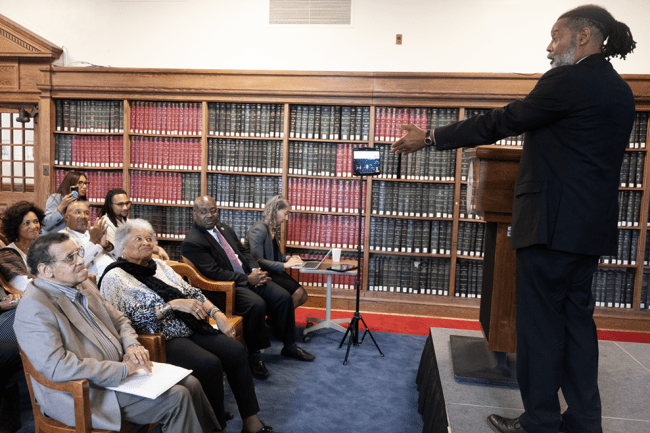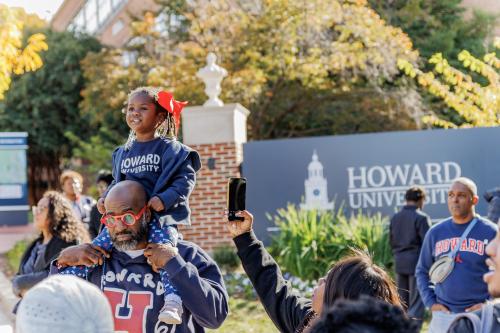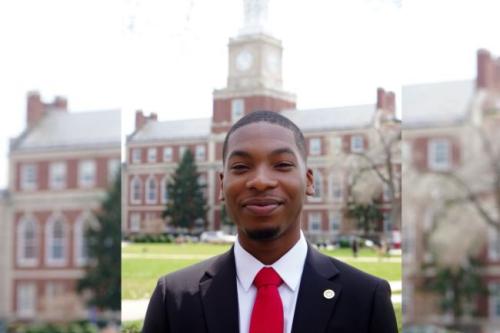On Friday, Sept. 26, Dr. Talitha Washington shared her journey as a mathematician, from growing up in Evansville, Indiana, to her current position as executive director of Howard University’s Center for Applied Data Science and Analytics, the Sean McCleese Endowed Chair, and Professor of Mathematics, and noted a strange conversation while attending graduate school at the University of Connecticut.
“After I got there, people asked, ‘What country are you from?’ And I thought ‘what’s happening here?’” she said. “I said Indiana. … I finally found out that I was the first [Black American] to enter their Ph.D. mathematics program and subsequently the first to get out.”
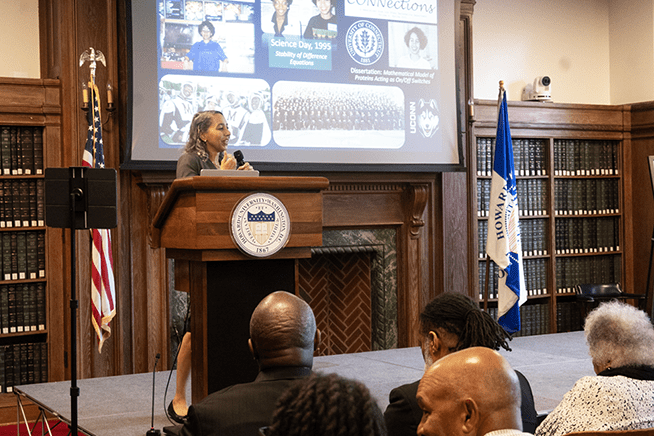
That distinction was one of several connections Washington has with Dr. Elbert Frank Cox, who, 100 years ago to the day, became the first Black person in the world to hold a Ph.D. in mathematics, earning the degree from Cornell University in 1925. To celebrate this historic occasion, Washington organized the “Cox Centennial Celebration of 100 Years of Black Ph.D. Mathematicians,” which brought together mathematicians from across the country to celebrate Cox’s legacy and lasting impact on the field.
Across two days, faculty and students from Howard and other institutions, representatives from leading mathematics associations, and even Cox’s family gathered in Founders Library’s Browsing Room to examine his extraordinary impact as a researcher, educator, and mentor. The event included talks by leading researchers, a roundtable discussion on Cox’s legacy with Howard faculty and students, and a proclamation from the National Association of Mathematicians honoring his life and work. The event also featured a fireside chat with Cox’s son, former Associate Vice President for Academic Affairs and Dean of Engineering Elbert Lucien Cox Sr., and grandson, Howard alum and NASA Astrophysics Division Program Executive E. Lucien Cox Jr. (MEG ’99).
“It is an honor to support this historic celebration,” said Dr. Margie Vela of AWS Machine Learning University. “Dr. Cox’s groundbreaking contributions to mathematics and his enduring legacy as a scholar and mentor continue to inspire generations of thinkers. We are proud to support this gathering of mathematicians, educators, and innovators who carry forward his spirit of inquiry and discovery.”
A Legacy of Resilience and Brilliance
In her opening remarks on Saturday, Sept. 27, Dr. Kim Lewis, Associate Dean for Research, Graduate Programs, and Natural Sciences, highlighted Cox’s impact on Howard University in particular.
“Dr. Cox’s impact on Howard was profound,” she began. “Joining our faculty in 1929, he devoted more than three decades here to teaching, mentoring, and building the department of mathematics.”
Kicking off the day’s celebration, Lewis reflected on what Cox’s legacy meant to her personally, as she looked back on her own time as one of the few Black women pursuing a degree in applied physics from the University of Michigan.
“It was a journey marked by moments of isolation, but also of resilience. A journey made possible due to trailblazers like Dr. Cox, who shattered barriers with quiet brilliance and opened doors for all of us who came after.”
Later talks echoed this theme of barrier shattering, as speakers traced Cox’s life from growing up in Evansville, Indiana — the same neighborhood Dr. Washington grew up in — through his early education to his decades-long career at Howard.
Evansville Human Relations Commissioner Watez Phelps set the context for Cox’s journey, underscoring the profound segregation and racism in the city, a Ku Klux Klan stronghold which, when Cox was six years old, was the site of a race riot that left 13 dead and prompted 2,000 of the 8,000 Black residents to flee. Despite deep segregation and hostility, a Black professional class steadily rose in Evansville, and included Cox’s father, Johnson D. Cox, a school principal who ensured that Cox and his brother were able to attend university.
Although his father’s position afforded him a comparatively middle-class upbringing, Cox faced harsh discrimination throughout his time at university, including being barred from the Phi Beta Kappa Honor Society and even made to listen to some lectures from the hallway, away from his white peers. Despite these barriers, Cox was able to find a few mentors at Indiana, and would go on to be one of very few students to graduate with a 4.0 GPA in mathematics, a legacy of perseverance that he carried through service in World War I, a position at Shaw University, and his studies at Cornell.
A Pioneering Figure and Mentor
Besides Cox’s journey, other speakers spoke of his personal contributions to the field, breaking down the mathematics of his dissertation, “Polynomial Solutions of Difference Equations,” published in 1934 in Japan’s Tohoku Mathematical Journal — nearly a decade after earning his doctorate, as U.S. and English journals refused the paper — as well as his 1947 paper “On a Class of Interpolation Functions for Systems of Grading,” which offered innovative approaches to evaluating student performance in mathematics.
He said it’s important for those of us who’ve gotten in the door to keep the door open, so that others may follow behind us.
Speakers also emphasized the enormous impact he had on future generations of Black mathematicians. In his speech, renowned mathematician and National Association of Mathematicians co-founder Johnny Houston pointed out that in the 25 years after Cox earned his Ph.D., only 16 other Black doctorates followed.
“Cox said that’s not enough. We need to do more,” said Houston. “He said it’s important for those of us who’ve gotten in the door to keep the door open, so that others may follow behind us. Not to just sit on a stool like a king to be praised, but to say, ‘We are going to inspire. We are going to empower. We are going to encourage and get these people through just like the others.”
Cox’s tenure at Howard is a testament to that mission. As he rose from associate professor to chair of the Department of Mathematics and later the Department of Mathematics and Astronomy, he was the direct mentor of a record-breaking 30 master’s students. In his role, he emphasized the need for strong standards for foundational knowledge in algebra, analysis, geometry, and topology, as well as for students to engage in independent research and serve as mentors. His tireless work as chair was critical to the launch of the mathematics Ph.D. program at Howard in 1976, the first such program at an HBCU, although he himself passed away before the launch in 1969.
A Continuing Tradition of Education Leadership
E. Lucien Cox Sr. described his father’s impact on his direction in life as subtle.
“We knew how much of a giant my father was, but it wasn’t well known, most of my friends didn’t know that he was the first Black American –– the first Black period –– to get a Ph.D. in mathematics,” he said during his fireside chat. “I don’t know when I first knew that.”
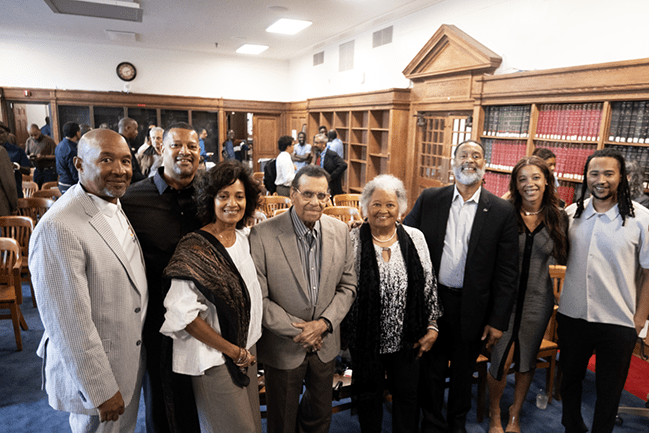
He went on to joke that as a child, he was mainly focused on being an acrobat, then a fireman, before landing on mathematics, when he realized his father was involved in it in some way.
Growing up, Lucien Sr. was reluctant to approach his father with help in math. But he recalls a formative memory when he asked him for help on one particularly difficult arithmetic problem — a memory that demonstrated Elbert Cox’s direct, independence-focused approach to teaching and mentoring.
“And he said, “Lucien? I’m not going to work this problem for you. But I am going to show you what to do to work this problem,’” Lucien Sr. said. Being walked through the problem step by step and guided to thinking about the solution on his own, shaped how he approached mathematics, and was instrumental in him deciding to pursue it at Howard.
Lucien Sr. brought that philosophy into his own teaching as an engineering faculty member, and recalled how he graded his own students more than anything on whether they have shown the steps in their design and if they’d done the mental work on their own to reach a conclusion, rather than what the conclusion itself was.
“He wanted to educate,” he said. “He wanted to give back, and that was his way … to give back his education to others to follow in his footsteps.”
Though not an educator, today Lucien Jr. continues the dedication to education like his father and grandfather. During his remarks on Friday, he announced the nonprofit MathSTEM, which he co-founded with his wife, Eurica Cox. The mission of the organization is to “help K–6 students in the DMV Metro area and beyond build a strong foundation in mathematics,” focusing on supporting struggling young students through innovative programs that incorporates gamified math techniques and incorporating it into kids’ everyday lives.
“How you teach math matters,” Lucien Jr. said. “How you receive instruction matters. We don’t receive everything the same way, so we’re going to come up with a way where teachers can find the best fun way to teach math so that all students succeed.”
In his opening remarks, Howard Provost and Chief Academic Officer Dr. Anthony Wutoh also underscored the need to open doors for others.
“One of the things we’ve heard frequently is that you may be the first, but make sure that your life and your excellence don’t limit you to being the only,” he said. “Certainly, as we study the life of Dr. Cox and his family … his life certainly made sure that he was not the last.”


